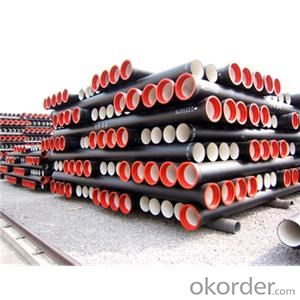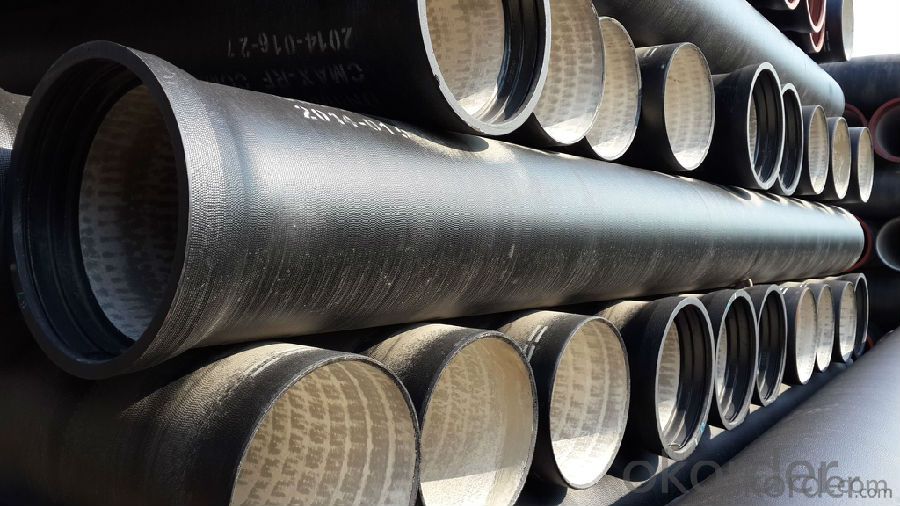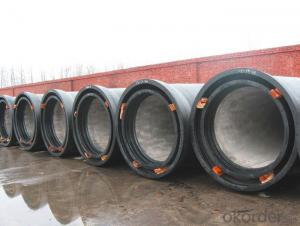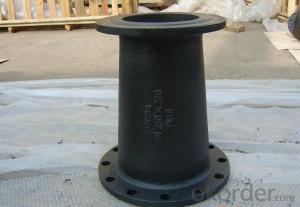Ductile Iron Pipe EN598 DN100-DN700 K9 Top Supplier in China
- Loading Port:
- China main port
- Payment Terms:
- TT or LC
- Min Order Qty:
- 20 m.t.
- Supply Capability:
- 200000 m.t./month
OKorder Service Pledge
OKorder Financial Service
You Might Also Like
1. Ductile Iron Pipe Description :
DI pipe fittings are manufactured according to ISO 2531 or BS EN545 or BS4772 FOR POTABLE WATER ,internal is cement lining or wet epoxy coating;External is zinc plus bitumen or wet epoxy coating. We also manufacture ductile iron fittings with fusion bonded epoxy both inside and outside. All the producets are sutible to water pipes fields.We have passed ISO9001,ISO14001,OHSMS18001 certificate.
2. Main Features of the Ductile Iron Pipe:
2. Standard: ISO 2531, EN545, EN598, ANSI, AWWA
3. Certificate: ISO9001, ISO14001, SGS, NSF, WRAS
4. Test: In accordance with ISO 2531 / EN 545 / EN598 and 100% water pressure test
5. Length: 6m or cut into 5.6m, 5.7m, 5.8m
6. Internal Lining: Cement, conform to ISO4179
7. External coating: Zinc + Bitumen, conform to ISO8179
8. Rubber: NBR, SBR, EPDM according to ISO4633 / EN681.1
9. Note: The gaskets, bolts & nuts are supplied respectively as your special requirement
3. Ductile Iron Pipe Images:


4. Ductile Iron Pipe Specification:
Grade: A53 Grades A/B, ASTM A106 Grades B/C,ASTM A179
AWWA, C200, ASTM A139, ASTM A120, API 5L Grade B
X42, X52, X56, X60, X65, X70, X80, X100
Weld Alternatives: LSAW
OD size range: 6.4~44.5mm
Wall thickness: 406.4~1422mm
Length: 3 - 12 m according to requirment
Note: Other grade can also be provided after consulting. Special design are available
for coal slurry conveyance LSAW line tube
5. FAQ:
We have organized several common questions for our clients,may help you sincerely:
1.Q: Why would you choose ductile iron pipe rather than other pipe materials?
A:The reasons are obvious for that not only ductile iron pipe possesses the inherent strength and flexibility of ductile iron, combined with proven corrosion protection systems, but also the cost savings can be achieved from design to installation and commissioning.
2.Q:Why can you guarantee the inner of pipes can’t be corroded?
A: High alumina cement mortar lining and sulphate-resistant cement mortar lining. These two special linings are applicable to inner anti-corrosion for sewage pipes, improving resistance to erosion of the sewage components.
- Q:Are ductile iron pipes suitable for road crossings?
- Yes, ductile iron pipes are suitable for road crossings. Ductile iron is a strong and durable material that can withstand heavy loads and traffic. It has high tensile strength and flexibility, making it an ideal choice for underground installations beneath roads. Additionally, ductile iron pipes are resistant to corrosion and have a long lifespan, making them a reliable option for road crossings.
- Q:The plug connection DN800 ductile iron pipe has been installed. "Shall I think so?"
- Ductile iron pipes are defined as pipes made by casting more than 18 of casting molten iron by adding a spheroidal agent and then centrifugally centrifugally cast by a centrifugal nodular cast iron machineDuctile iron pipe ([span]Ductile Cast Iron Pipes), referred to as ball pipe, ductile iron pipe and ductile iron pipe etc..
- Q:What is cast iron pipe?
- According to its manufacturing methods can be divided into: sand, centrifugal pipe, straight pipe, continuous cast iron pipe and sand pipe.According to the material used, it can be divided into gray iron pipe, nodular cast iron pipe and high silicon iron pipe.
- Q:Can ductile iron pipes be used in contaminated soil conditions?
- Yes, ductile iron pipes can be used in contaminated soil conditions. Ductile iron is known for its strength and durability, making it resistant to corrosion and damage from external factors such as soil contaminants. Additionally, ductile iron pipes have been successfully used in a variety of challenging environments, including contaminated soils, where they can provide reliable and long-lasting underground infrastructure for the transportation of water and other fluids.
- Q:Can ductile iron pipe be used for wastewater treatment plant sludge dewatering?
- Yes, ductile iron pipe can be used for wastewater treatment plant sludge dewatering. Ductile iron pipe is known for its durability and corrosion resistance, making it suitable for applications in wastewater treatment plants. It can effectively handle the sludge dewatering process and provide reliable performance for long-term use.
- Q:How do ductile iron pipes handle extreme temperatures?
- Ductile iron pipes are highly resistant to extreme temperatures. They can handle both high and low temperatures without any significant impact on their performance. This is due to the unique properties of ductile iron, including its high thermal conductivity and low thermal expansion coefficient. These characteristics allow the pipes to remain stable and durable, making them suitable for a wide range of temperature conditions.
- Q:Are ductile iron pipes suitable for sewer force mains?
- Sewer force mains can indeed make use of ductile iron pipes. Ductile iron, a variant of cast iron, possesses a higher degree of strength and flexibility in comparison to conventional cast iron pipes. This quality renders it suitable for applications where pipes must endure high pressure and heavy loads, such as sewer force mains. Ductile iron pipes exhibit exceptional resistance against corrosion and boast impressive durability, which proves vital for sewer systems that face exposure to various corrosive substances and challenging environments. Moreover, these pipes possess the ability to absorb vibrations and shocks, thereby reducing the risk of pipe failures caused by external forces. Furthermore, ductile iron pipes possess a renowned reputation for their lengthy service life, frequently extending beyond 100 years. As a result, they constitute a cost-effective choice for sewer force mains, necessitating minimal maintenance and replacement throughout their lifespan. In conclusion, ductile iron pipes offer a dependable and long-lasting solution for sewer force mains, delivering the requisite strength, flexibility, and resistance to corrosion to ensure the efficiency and durability of sewer systems.
- Q:What is the cost of ductile iron pipes compared to other materials?
- Several factors, such as size, length, and application, can cause the cost of ductile iron pipes to vary when compared to other materials. Generally, ductile iron pipes are more expensive than PVC or HDPE pipes due to their superior strength, durability, and longevity. Although the initial cost of ductile iron pipes may be higher, they offer a cost-effective solution in the long term because of their extended lifespan. With a life expectancy of over 100 years, ductile iron pipes are reliable and require minimal maintenance for water, sewage, and gas distribution systems. This longevity reduces the need for frequent replacements, repairs, and associated expenses. Additionally, ductile iron pipes are known for their exceptional resistance to external loads, pressure, and corrosion, making them suitable for various applications, including high-pressure water and gas transmission, industrial pipelines, and sewer systems. The inherent strength of ductile iron pipes allows for thinner walls, resulting in reduced material and installation costs compared to other materials. It is important to consider that the cost of ductile iron pipes can also be influenced by market conditions, transportation costs, and the availability of raw materials. Therefore, it is advisable to consult with suppliers and conduct a cost-benefit analysis before making a decision.
- Q:Are ductile iron pipes suitable for use in acidic environments?
- Highly acidic environments are generally unsuitable for the use of ductile iron pipes. While ductile iron is recognized for its strength and durability, it does have limitations in acidic conditions. Over time, acidic environments tend to corrode and deteriorate ductile iron pipes. Corrosion occurs when the acid in the environment reacts with the iron in the pipe, eventually leading to pipe failure. The rate at which corrosion occurs depends on several factors, including the concentration and type of acid, temperature, and duration of exposure. Acidic environments with pH levels below 4 or 5 can significantly accelerate the corrosion process. To address this limitation, alternative materials such as stainless steel or corrosion-resistant alloys like PVC or HDPE pipes are often recommended for use in acidic environments. These materials exhibit superior resistance to corrosion and can withstand the harsh conditions associated with acidic environments. However, it is worth noting that ductile iron pipes may still be suitable for use in mildly acidic conditions or if protective measures are implemented to prevent corrosion. The application of protective coatings or linings to the pipes can help minimize the corrosive effects of acids. Consulting experts or engineers who are knowledgeable about the specific conditions and requirements of the project is crucial in determining the most appropriate material for use in acidic environments.
- Q:Are ductile iron pipes suitable for potable water applications?
- Yes, ductile iron pipes are suitable for potable water applications. They have proven to be a reliable and durable choice for carrying drinking water due to their high strength, corrosion resistance, and ability to withstand internal and external pressure. Additionally, ductile iron pipes have been widely used in water distribution systems around the world for many years.
1. Manufacturer Overview |
|
|---|---|
| Location | |
| Year Established | |
| Annual Output Value | |
| Main Markets | |
| Company Certifications | |
2. Manufacturer Certificates |
|
|---|---|
| a) Certification Name | |
| Range | |
| Reference | |
| Validity Period | |
3. Manufacturer Capability |
|
|---|---|
| a)Trade Capacity | |
| Nearest Port | |
| Export Percentage | |
| No.of Employees in Trade Department | |
| Language Spoken: | |
| b)Factory Information | |
| Factory Size: | |
| No. of Production Lines | |
| Contract Manufacturing | |
| Product Price Range | |
Send your message to us
Ductile Iron Pipe EN598 DN100-DN700 K9 Top Supplier in China
- Loading Port:
- China main port
- Payment Terms:
- TT or LC
- Min Order Qty:
- 20 m.t.
- Supply Capability:
- 200000 m.t./month
OKorder Service Pledge
OKorder Financial Service
Similar products
New products
Hot products
Hot Searches
Related keywords


























